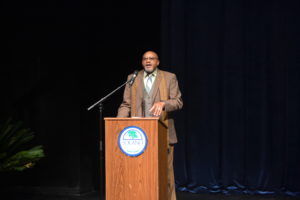
Tommie Smith, an Olympic gold medalist and human rights advocate, speaks at Solano Community College on Thursday. (Photo by Nick Sestanovich)
On the eighth day of Black History Month and the first night of the Winter Olympics, gold medal track and field athlete— and human rights advocate— Tommie Smith delivered a speech at Solano Community College Theatre. Fifty years earlier, Smith and fellow runner John Carlos raised gloved fists at the medal ceremony at the Summer Olympics in Mexico City, drawing controversy but also providing an iconic image of the Olympics and the Civil Rights Movement. Smith’s speech reflected on that day and also allowed him to provide life lessons to the audience.
When Smith performed what he called his “silent gesture” in 1968, it was done in what has been considered a very turbulent year in history. Earlier that year, Dr. Martin Luther King, Jr. was assassinated, which triggered riots in several major cities. Smith cited King throughout his speech, referring to him as “an oratorial poet recognized by many as a disturber of unjust peace” who “brought direct attention to the inhumane and unconstitutional treatment bound the ignorance of racist ideology.”
Smith said that part of the reason that his and Carlos’ gesture drew so much attention was because it was the first year that the track and field games were broadcast live.
“This is one of the reasons why the victory stand went around the world,” he said. “It was so powerful in the sense that it represented many of these personalities, not of hate but just the way you were.”
Smith recalled being a senior in high school when King delivered his famous “I Have a Dream” speech in 1963.
“Dr. King’s work and words have withstood the test of time, the weathering of time,” Smith said. “Time is an infinite space, and working together toward unity must continue indefinitely. Let no man, woman or child indicate to anybody that overcoming is a dead issue.”
One of the main themes of Smith’s speech was not being afraid of the word “sacrifice.”
“We know the roots of inequality and the sacrifice by our forefather just so you and I could sit and stand where we are now,” he said.
Smith said he was in a similar situation 50 years ago when he and Carlos made their gesture at the Olympic games.
“There were no malignant tactics intended,” he said. “It was a cry for freedom. The victory stand highlighted truths of why it had to happen. I didn’t want to do it, but I had no choice but to continue moving forward.”
Smith also offered advice to the younger generation that “it’s OK to dream.”
“Just don’t go to sleep in class,” he joked.
“There is power in dreaming,” he said. “Dr. King in 1963 also said ‘I have a dream that one day in the red hills of Georgia, the sons of slaves and the sons of slaveowners will rise and be able to sit down at a table for brotherhood.’”
“Today,” Smith, who lives in Georgia, said, “I am living Dr. King’s dream.”
One thing Smith said has changed 50 years later is the avenues by which people can deliver their messages of social justice.
“You don’t have to run a 200-meter race for a record time of 19.83 seconds in front of the world to make a social awareness statement and then be ridiculed and prosecuted,” he said. “It has already been done for you.”
Following his speech, Smith answered questions from the audience. One person asked his thoughts on Colin Kaepernick, the former San Francisco 49ers quarterback who drew controversy for kneeling during the national anthem to protest police brutality. Smith said he had talked to Kaepernick about it, and he said he did what he felt was necessary at the time. He encouraged Kaepernick to continue doing what he felt was right and be willing to pay the price for it.
“Whatever you do out there,” Smith said, “you want to make a stand, don’t do it because your buddy did it. You better have a plan, and you must be able to explain why you did it and accept the repercussions of your actions.”
Another audience member asked what it was like to go back to Mexico City in 2008. Smith said it was the first time he had been back since the Olympics, and it was very emotional for him.
“I cried because that was the ending of something great and the beginning of something greater,” he said.
The most bittersweet moment for him and Carlos, Smith said, was when they walked on the turn where they first raced and attempted to run. They were unable to run, so they just walked and then jogged.
“We started jogging, and it rained,” he said. “In 1968, we started to race, and what happened? It rained.”
Following the speech, a line was formed in the lobby for Smith to sign copies of his 2007 autobiography “Silent Gesture.”
The event was one of several being hosted at SCC for Black History Month. Other events include a screening of the documentary “For the Love of Liberty” on Feb. 14 and a genealogy workshop called “Find Your Roots” on Feb. 21.






Leave a Reply